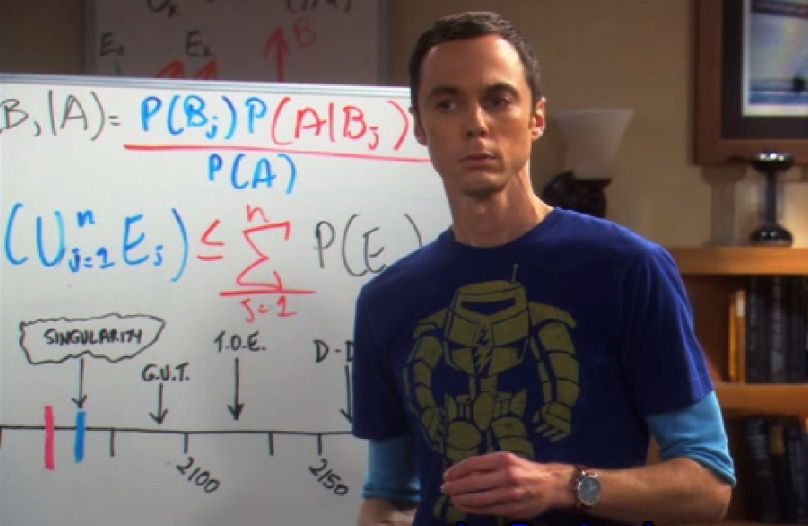One-dimensional nearest-neighbour random walks
A random walk is a random process consisting of a sequence of discrete steps of fixed length. In the case of one-dimensional nearest-neighbour random walks, the reachable states are integer (or natural) numbers and at each step, the process jumps to the nearest-neighbour to the right with probability p or to the nearest-neighbour to the left with probability 1 - p.
A random walk with state space equal to Z (integer numbers) can be transient or null recurrent depending on p. If p=1/2 then it is null recurrent and in other cases it is transient. Look at the book by S. Ross (Example 4.3d).
A random walk with reflectant barrier at 0 (i.e., state space equal to non negative integers) can be transient, null recurrent or positive recurrent. Look here (local copy).
Curso 2012-2013
Estamos actualizando la web para el curso 2012-2013.
La primera clase será el 1 de octubre de 2012.
Schedule of presentations
The topics and presentation dates have been assigned as follows:
Jan 27. From 16:00. (Seminar A23)
1.- Bio-PEPA. Estíbaliz Fraca
2.- Cellular Automata. Jorge Álvarez
3.- Random Neural Networks. José Vicente Ruiz
Feb 3. From 16:00. (Seminar A23)
4.- The Systems Biology Markup Language (SBML). Xu Wang
5.- Higher order Markov chains. Fluid Neural Networks. Miguel Aguilera
Some slides on Petri nets and Stochastic PNs
Some slides on Petri nets and time augmented Petri nets are available here.
Topics for the presentations
In order to obtain the credits of the course, each student has to prepare and perform an oral presentation of around 25 minutes (any duration between 20 and 30 is ok) on one of the following topics:
1.- Cellular Automata
2.- The Systems Biology Markup Language (SBML)
3.- Bio-PEPA
4.- Random Neural Networks
5.- Density Dependent Markov Chains
6.- Higher order Markov chains
The presentations are expected to provide a gentle introduction to the topic as well as to its potential applications.
The topics will be assigned to the students as follows: a) each student has to send an email (both to Javier Campos and Jorge Júlvez) with a list of topics he’s willing to present. The list must contain 5 topics ordered according to his preference; b) the sooner a student sends the email the higher his priority to be asigned a higly preferred topic.
The presentations will take place on Jan 27 and Feb 3 at 16:00 in the usual seminar. As soon as the topics are assigned, the schedule of the presentations will be posted in this webpage.
Change in the scheduled topics
According to the official teaching calendar, we have only two additional pending lectures, scheduled for December 16th and January 13th respectively.
Instead of introducing Hidden Markov Models (HMM), these two lectures we will devoted to introduce (timed and/or stochastic) Petri net models, some analysis techniques for them (December 16th) and their application for the modeling of chemical networks (January 13th).
The students interested on HMM are encouraged to read the slides and the tutorial written by L.R. Rabiner.
Some more slides on SSA
The SECOND part of the slides about “Stochastic Simulation of Biochemical Reactions” is available here.
Stochastic Simulation Algorithms
The first part of the slides about “Stochastic Simulation of Biochemical Reactions” is available here.
Sin servidores este fin de semana
 Según nos informa el Servicio de Mantenimiento del Campus, este sábado, día 20, hay un corte de corriente programado en el Edificio Ada Byron para la realización de unas obras (instalación de unos nuevos equipos de protección).
Según nos informa el Servicio de Mantenimiento del Campus, este sábado, día 20, hay un corte de corriente programado en el Edificio Ada Byron para la realización de unas obras (instalación de unos nuevos equipos de protección).
Al realizarse el corte fuera del horario laboral del Personal de Administración y Servicios del DIIS capacitado para realizar las operaciones de apagado y encendido de servidores, en esta ocasión (debido a compromisos previos) no es posible ajustar al máximo el tiempo de pérdida de servicio (como se ha hecho otras veces).
Por lo tanto, el calendario de actuaciones será:
- Viernes 19, a partir de las 14:30, comienza el apagado de servidores del DIIS, quedando todo apagado (incluidos los servidores web) excepto lo mínimo imprescindible para la realización de prácticas.
- Viernes 19, a partir de las 20:00, se apaga el servidor de prácticas y resto de infraestructuras de la sala de servidores; queda todo apagado durante todo el fin de semana.
- Lunes 22, a partir de las 8:00, comienza el encendido de servidores (condicionado al funcionamiento de la infraestructura de comunicaciones); se interará que a la misma hora el SICUZ verifique también los servicios de red.
TBBT
Yes. Sheldon also uses probabilistic models. ![]()
